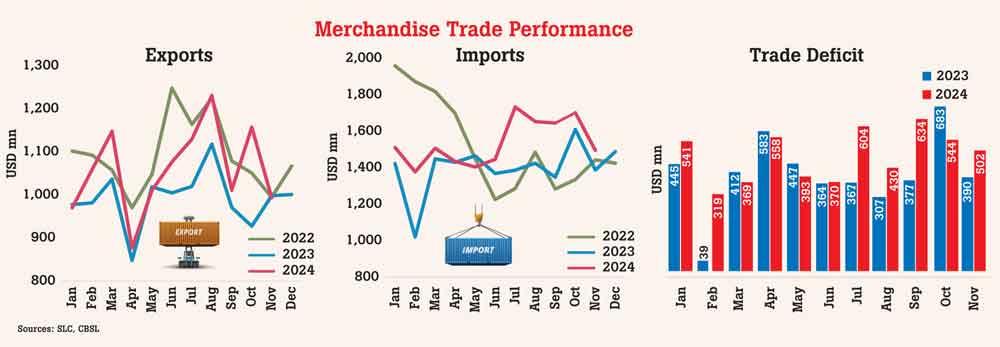Reply To:
Name - Reply Comment

Sri Lanka’s trade deficit widened to US $ 502 million in November 2024, compared to US $ 390 million recorded in November 2023, due to an increase in import expenditure and a marginal decline in export earnings.
The cumulative deficit in the trade account for the period January to November 2024 widened to US $ 5.24 billion, from US $ 4.41 billion recorded during the same period in 2023.
The expenditure on merchandise imports increased by 7.7 percent year-on-year (YoY) to US $ 1.496 billion in November. The increase in import expenditure was observed across all main categories of imports, supported by the significantly low base recorded in the corresponding period in 2023, the Central Bank said.
November saw consumer goods imports expand compared to the same period a year earlier, resulted by higher spending on both food items (primarily edible oils) and non-food items (primarily home appliances and clothing and accessories).
The expenditure on intermediate goods imports increased, primarily due to the higher imports of textiles and textile articles, with wheat, rubber and articles thereof, food preparations and vehicle and machinery parts also recording moderate increases.
The expenditure on investment goods recorded a marginal increase, driven by higher imports of transport equipment compared to the previous year.
November saw the earnings from merchandise exports decline marginally by 0.5 percent YoY to US $ 994 million, due to a reduction in mineral and industrial exports, despite an increase in agricultural exports.
The earnings from the exports of industrial goods declined marginally in the month under review, primarily due to the reductions in transport equipment, gems, diamonds and jewellery as well as machinery and mechanical appliances. However, a notable increase was observed in petroleum product exports, driven by higher export volumes, while the textiles and garments exports recorded broadly a similar level of exports.
The earnings from agricultural exports increased, mainly due to higher volumes of spices, alongside increased exports of tea and coconut-based products. Meanwhile, the earnings from mineral exports recorded a decline.
The terms of trade, the ratio of export prices to import prices, deteriorated by 1.9 percent in November 2024 compared to November 2023, as the decline in export prices outpaced the decline in import prices.
The export volume index improved by 2.5 percent, while the unit value index declined by 2.9 percent, indicating that the reduction in export earnings in November 2024 compared to November 2023 was primarily due to the lower export prices.
Meanwhile, the import volume index increased by 8.9 percent while the unit value index declined by 1.0 percent, implying that the increase in import expenditure in November 2024 compared to November 2023 was driven by higher volumes.